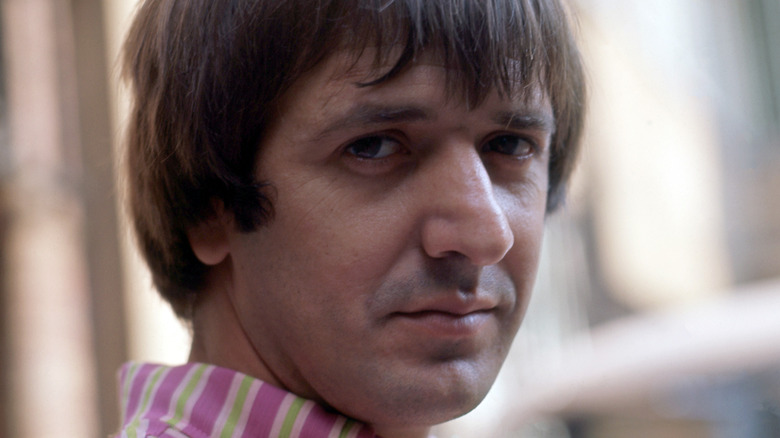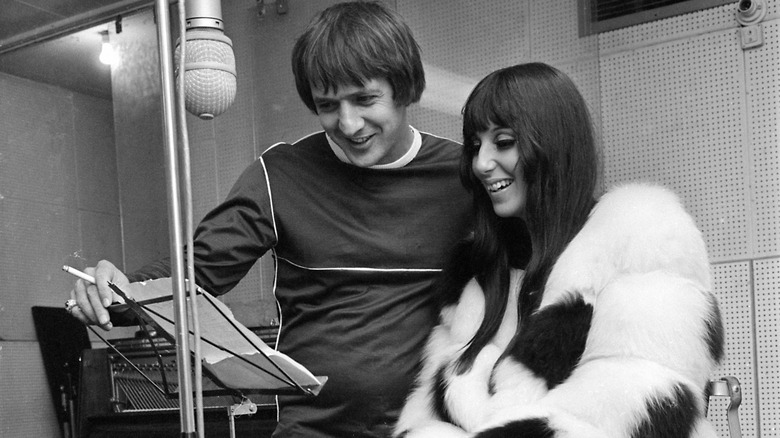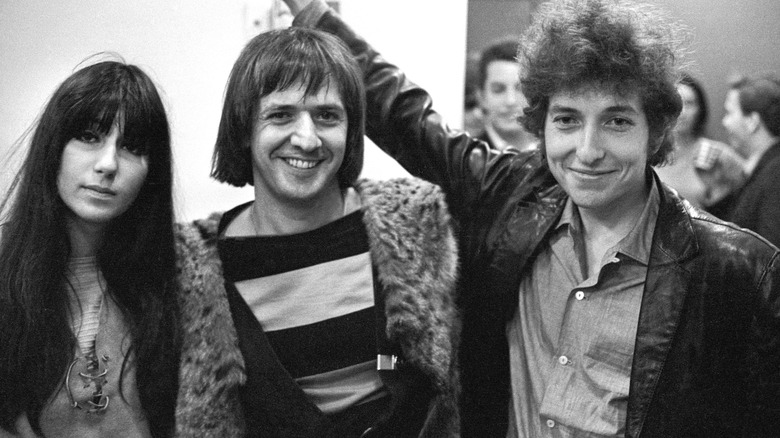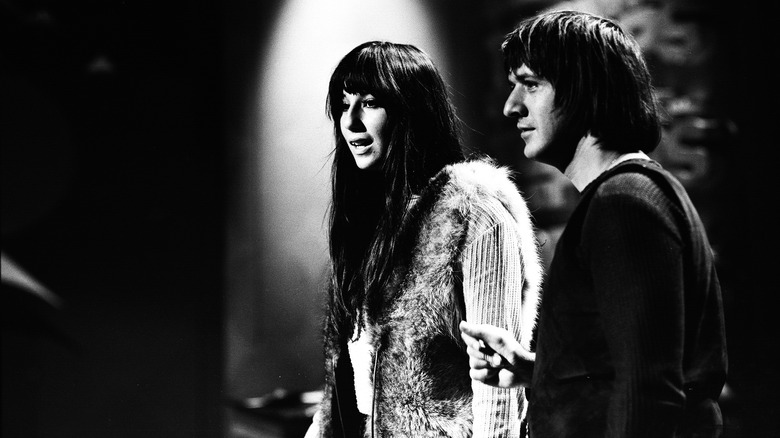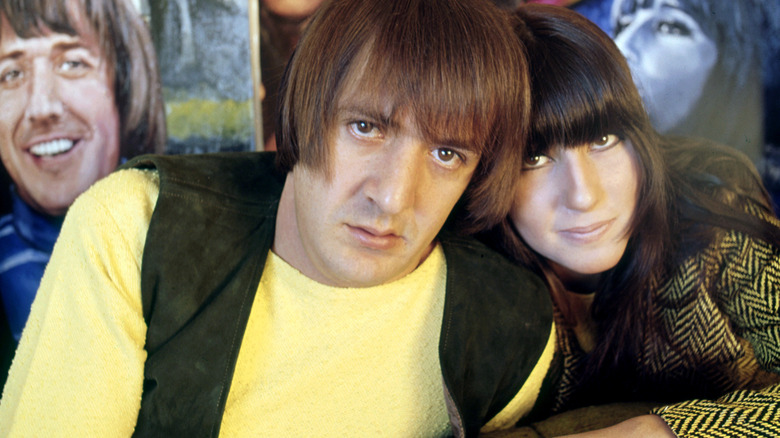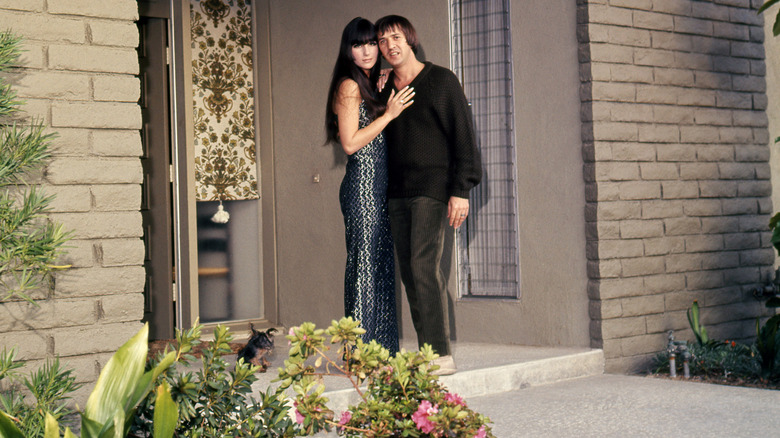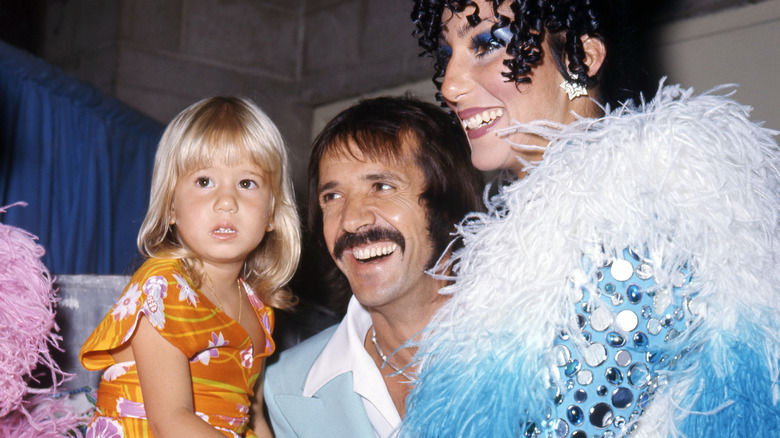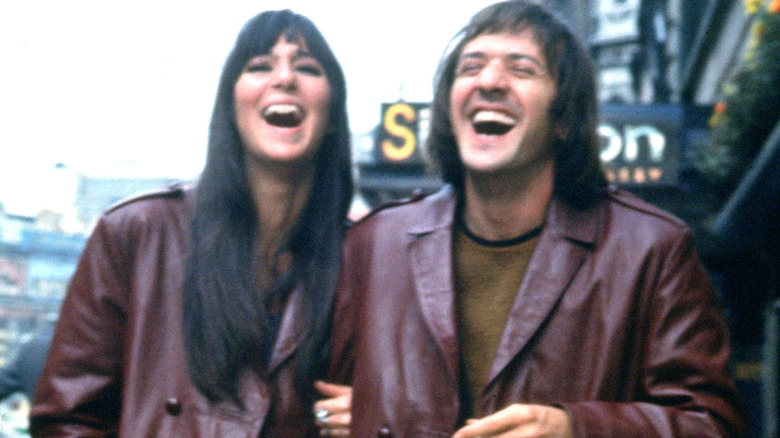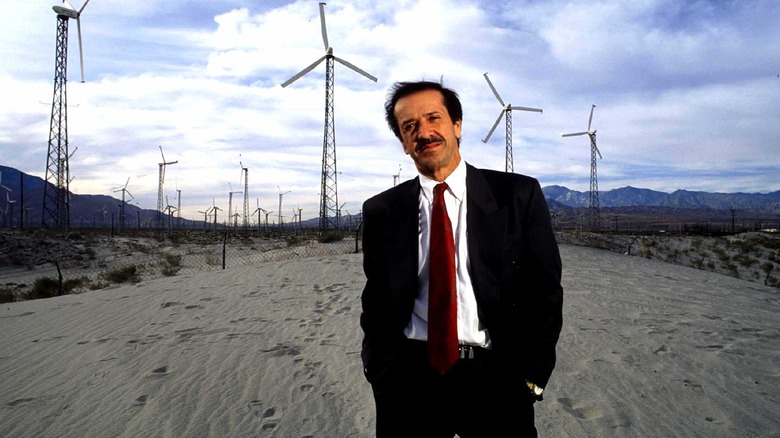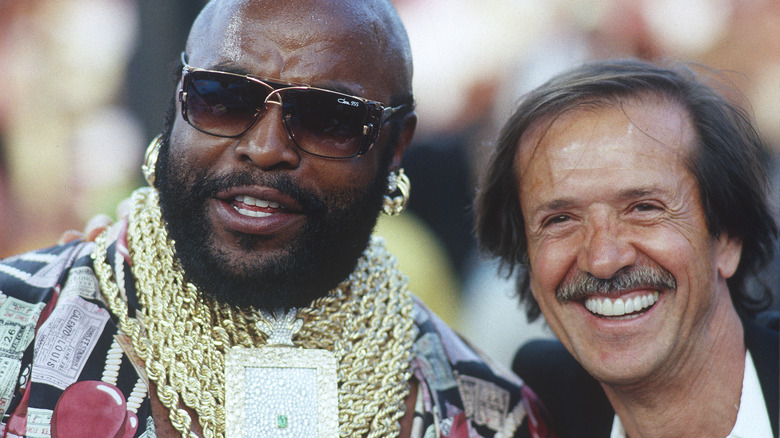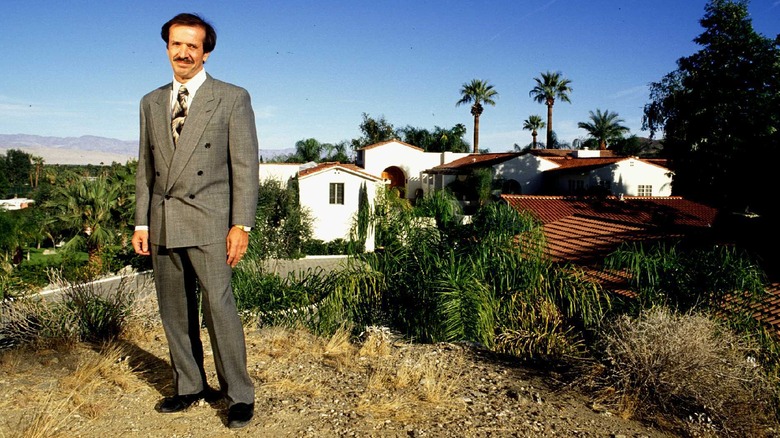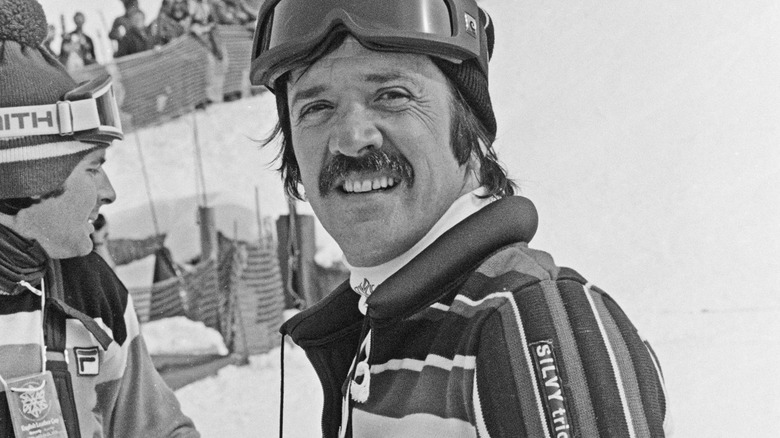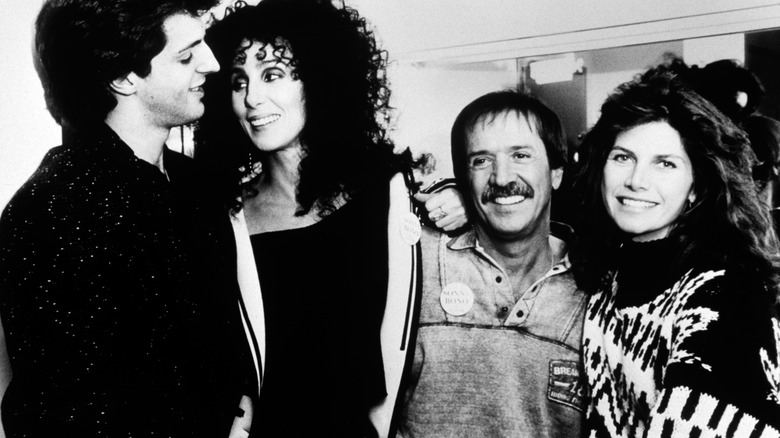The Untold Truth Of Sonny Bono
Sonny Bono might be best known as the "other" half of the more famous duo of Sonny and Cher, but he had a pretty wild life in his own right — not just in the shadow of his more glamorous then-wife. It was a pretty strange life, too, one that was shortened by a tragic accident.
He wasn't just the guy that could kind of sing and was good at playing the goofball: Bono was the one writing and producing all of those songs. He wasn't the first person who made the jump from entertainment to politics, and he definitely wouldn't be the last — but he would make a surprising difference. He studied under the now-disgraced Phil Spector — and had some fascinating observations to make about him — has been open about his post-relationship struggles, and proved that it doesn't matter how long it takes, it's never too late to get things back on track.
Much, much more than just the guy that sings about the beat going on, and sporting a wardrobe and style that's the textbook definition of the 1970s, Sonny Bono's admittedly short life was a wild ride.
Sonny Bono always knew his limits
Sonny Bono always got a bit of grief for not being a great singer, and here's the thing: He absolutely knew his limitations, and that he didn't have the best voice out there. According to The Washington Post, he was a behind-the-scenes guy until Cher — then a teenage hopeful — got so unbearably nervous about singing alone that she asked him to perform with her. The rest is, as they say, history, but when it came to his own voice, Bono had no delusions.
Interviewed for a 10-part music series with In the Groove (via OpenVault), he talked about how he wanted to be both a songwriter and a singer. "I always knew I was limited as a singer, and it used to frustrate me," he said. "I mean, I used to try so hard, seven different kinds of voices to try to find a voice that would work and I just didn't have the power in my, my pipes, but I was determined to become a singer as well."
Bono went on to say that it was performing that he was determined to do — so, he went for it.
He broke into the business when funk wasn't funky enough
Everyone has to start somewhere, and in an interview for In The Groove (via OpenVault), Sonny Bono said that one of his first big contributions to the industry was the early 1960s hit called "Needles and Pins." That Bono-penned tune was picked up by the Searchers and turned into a hit, and it came at a time when he had a regular job delivering meat along Sunset Boulevard. He'd have a new song ready to go every Monday, and along with his deliveries, he'd pitch the song to all the record companies along the strip.
Bono recalled that he had gotten to be good friends with some of the artists along the way, including one over at Specialty Records. That particular artist, he said, had just gotten a recording contract at a time when the philosophy of the company was summed up in a sign in one of the studios: "Everything Is Bunk Except Funk."
It wasn't long after the contract was signed that Bono stopped in to find the artist and the producer who had been working with him were fired, and with the new openings, there was room for him to step in and get his official foot-in-the-door job. Great for Bono, and what about the as-yet-unnamed artist? That was Sam Cooke, who took his song — "You Send Me" — and kicked off a career as one of the most influential soul artists of music history.
It wasn't overnight success
According to The Washington Post, Sonny and Cher had five singles hitting the charts in September of 1956 — and he'd spent the previous 10 years getting other artists there. It was in the early 1950s that Bono had gotten a job with the legendary — and now-disgraced — Phil Spector. He was the guy fetching coffee, booking acts into studios for recording sessions, and doing some promo work — along with learning from Spector. In an interview with In The Groove (via OpenVault), Bono lauded Spector's almost magical ability to make massive hits happen. "I couldn't imagine how this sound got on a record, you know?" he mused.
He explained what it was like, from the random, 4 am phone calls to the difficulties: "Phil had seventeen different personalities, and you had to acclimate to every one, but if you wanted to be around the genius of him, that's what you did." Bono ended up being present for the recording of scores of the era's biggest records, but it wasn't long before he started getting bored with channeling the same old sound. Still, Spector was, he said, "very intimidating, because he was the god then, and everybody worked for him. And Phil? You were either in or you were out, with Phil."
After suggesting they change up their sound, Bono found himself permanently on the outs and decided things needed to change. After borrowing $135 and booking his own studio time, he and Cher recorded "Baby Don't Go" — and it got them their own contract. Their first release: "I Got You Babe."
Sonny Bono said he invented long hair
It's kind of appropriate that Sonny Bono is the quintessential hippie: The Washington Post says that his first song — which was recorded by the Righteous Brothers, and was something of a hit for them — was called "Koko Joe." He wrote it when he was working at a grocery store, and he had been inspired by cookies.
Although he got his start in the studios of the clean-cut 1950s, Bono told Vanity Fair that he was responsible for a major fashion trend of the '60s and '70s: long hair.
That, too, went back to Phil Spector. "Phil had long hair, and the reason he had long hair was he loved Beethoven," Bono explained. He and a few other people in Spector's circle started copying the look, and it was all starting long before the Beatles and the British Invasion began to take credit for it. "I think we were the original hippies," Bono said. "I think Phil was the original hippie and Sonny and Cher were the first real recognized ones, because we were the first ones to get national press on it. But, that's where it came from."
He was an invaluable part of Anthony Kiedis's childhood
When it comes to people who are pretty much an open book, they don't get much more open than Anthony Kiedis of the Red Hot Chili Peppers. From drug addiction to a complicated relationship with his father and always feeling as though he was the outcast, he's talked about it all. It's harrowing stuff, and it's tough to imagine what his life may have been without the most unlikely of role models.
That is, of course, Sonny Bono. Kiedis, says "Fornication: The Red Hot Chili Peppers Story," was 12 years old and attending the same high school that Phil Spector had graduated from when he became friends with Bono. Bono was already in his post-Cher phase, and the young Kiedis adopted him as the father figure that he had always needed. Bono was the one answering phone calls from the school and talking to the principal on his behalf, while Kiedis was hanging out with Bono's young child. Kiedis was even included in Bono family vacations: "We took a liking to each other, and he used to take me on different trips that my father might not have been able to afford."
Sonny Bono was supportive of his child's future transition ... to a point
ABC News says that it was in 2009 that the child of Sonny Bono and Cher — who had seen early stardom with regular appearances on their variety show — announced that they were going to be undergoing gender reassignment surgery. Since then, Chaz Bono wrote the book "Transition: The Story of How I Became a Man." In it, he talks about all aspects of his life, starting with a childhood where his father was always supportive.
Bono, he wrote (via The Buffalo News), always allowed him to wear boys' clothes, and even called him Fred. His father supported him when he came out as gay — years before he announced he was transgender — while Cher has spoken publicly about how difficult it was for her to accept (via Today).
That support, says The Washington Post, only went so far. Sonny Bono passed away before Chaz's transition, but in 1996, he was a member of the House of Representatives. That was also a year they were presented with legislative efforts involving gay marriage, and the Republican Bono said that legalizing gay marriage was something he couldn't support. "I'm not homophobic. I'm not a bigot. I'm not pandering to hatred. I simply can't handle it ... I wish I was ready, but I can't ..." He then addressed one of the three openly gay members of the House, saying, "I honestly can't go as far as you deserve, and I'm sorry."
He struggled with the Sonny-and-Cher break-up for a decade
"The Sonny and Cher Comedy Hour" ran for several years in the early 1970s, and was supposed to be the next step in the evolution of the duo. That didn't happen, though, and when their relationship very famously disintegrated in a high-profile way, Bono said that he was devastated — for years. "...when it's kicked out from under you that fast, you get very confused," he told Vanity Fair. "I mean, you are still going. Well, wait, wait, I've got all this power, but you really don't, and you go into confusion as to how to operate."
Part of the problem, he said, was that his entire life was wrapped up in Cher. It wasn't just a marriage, it was every aspect of his career, too — and he didn't know what to do when he suddenly had no option to even continue their variety show in an amicable way. That, he explained, ended when David Geffen got involved and insisted that he was the one that was going to be handling Cher's business. When Cher got her own show, it was the end. Still, it wasn't an easy recovery.
"After 10 years, I was able to disconnect — a real, true disconnect ... Up until then, in the back of your mind, you always have that picture of, 'This would be real good if I could do that with Cher,' or whatever. But to move forward, you really do have to disconnect. If you don't, you can't go on."
He had a serious beef with Palm Springs
Sonny Bono's unlikely foray into politics started innocently enough. In 1988, he was running a restaurant in Palm Springs, and when he tried to put up a larger sign, he ran into all the sorts of problems that only a small city with big ideas can put forward. So, he decided to run for mayor and even the playing field for those who weren't in the town hall clique.
He won — by a landslide — in spite of an admission to The Desert Sun, where he said so many people had thought he was running as a joke. It wasn't an easy road, and it wasn't long before a petition to recall him got thousands of signatures. Among the biggest beef were claims of broken promises, but according to what Bono told Vanity Fair, he saw that there was a lot that needed to be fixed — starting with corruption he claimed stemmed from that same clique that opposed him.
He made some serious accusations at the time, too, including condemning city officials for voting on issues — like real estate permits and permissions — that they had a financial stake in, and ignoring all the rules and regulations put in place to prevent conflicts of interest. The city council members that Bono took aim at told a completely different story, leaving the whole thing a muddled mess. Still, he talked his way out of the recall, served four years as mayor, and then headed to Congress.
Tom Cruise's then-wife introduced Sonny Bono to Scientology
When Sonny Bono did an interview with Vanity Fair, he used the phrase "our down stats are in liability." Thankfully, that struck a chord with the reporter, who quickly turned the conversation in another direction and confirmed that, yes, Bono had gotten involved in Scientology. Sort of. While he said, "I'm not a Scientologist per se, but I've done some Dianetics. ... That worked for me a lot when Sonny and Cher crashed."
He went on to say that he had first been exposed to Scientology when he started taking acting classes. His teacher — Milton Kateselas — was a Scientologist, and introduced Bono to Tom Cruises' then-wife, Mimi Rogers. She was an auditor, and sat down with him to give him the basics. It's that he credits with allowing himself "a real, true disconnect" from Cher, but after his death, both his widow and his mother had other opinions. Jean Bono told the NY Post that he had tried to recruit her: "He said, 'It'll be good for you.' He said, 'You just have to have faith.' He was brainwashed."
Bono's former assistant, Pam Mann, claimed that his association with Scientology went all the way back to the 1970s, and according to his widow, Mary Bono, the attempts he had made at breaking away from the organization had been refused. They even stepped forward to run his funeral service, but it was ultimately presided over by Catholic officials.
One of his biggest congressional achievements was an environmental one
The Salton Sea was an accident: According to The San Diego Tribune, it was created by accidental flooding in 1905. The very salty lake became a destination for all kinds of tourists, especially celebrities, before development projects crashed and burned. By the 1960s, there were a lot of undeveloped lots and empty streets, and by the end of the 1970s, there was even less — buildings that had been left were destroyed by tropical storms, and it became a dumping ground for everything from fertilizers and chemicals to sewage.
When Sonny Bono headed to Congress, it was in a district that contained part of the Salton Sea — and according to what his wife said after he passed away (via CNN), "Sonny said to me that he wanted his legacy to be saving the Salton Sea."
Bono spent two terms in Congress, and it was a project that was never far from his agenda — in part because the clock was ticking. It was estimated that if the area's decline continued, it would be uninhabitable — by anyone or anything — in 15 years. His death had an unexpected consequence: Bipartisan support for what had been his pet project resulted in the creation of the Sonny Bono Memorial Salton Sea Restoration Act, and ultimately in the cleanup of the area and the establishment of the Sonny Bono Salton Sea National Wildlife Refuge Complex.
Sonny Bono's death
Sonny Bono's death in 1998 came as a shock to everyone. According to official reports (via CNN), there had been nothing to suggest the possibility of a tragedy: Bono was described as an advanced skier, on an intermediate run, in a resort he'd been going to for decades. Conditions were good, and suddenly, he was gone. There were no witnesses to the accident, and the cause of death was ruled as having come from massive head injuries sustained after a collision with a tree.
Twenty years later, his widow, Mary Bono, spoke with the Reno Gazette-Journal about what had happened, saying that they had been planning on taking just another few days of family vacation before returning home for the Bono-founded Palm Springs International Film Festival. Bono set off down a slope, but his wife stopped to help their children. When they got to the first stop, he wasn't there. It was three days before his body was recovered, 25 feet from the main ski run.
Less than a week before, Michael Kennedy had been killed in a skiing accident. His death had prompted a conversation between Bono and his wife, where he promised to get a helmet ... before their next skiing holiday. It was later revealed that even if he had been wearing one, he would have suffered severe brain damage from the collision. Mary Bono went on to run for — and win — his Congressional seat, and make the focus of her career the then-burgeoning opioid crisis.
What Sonny Bono really had to do with copyright extension
Copyright laws have come a long way: According to The Washington Post, the first U.S. copyright laws only protected a work for 28 years. By the 1990s, major works from the 1920s — like those belonging to George Gershwin and Walt Disney — were nearing the public domain again. Copyrights were extended by the Sonny Bono Copyright Term Extension Act, and according to Stephen Carlisle (via Nova Southeastern University), that gave rise to the rumor that Disney had paid off then-Congressman Bono to do a little creative law-making that would allow them to keep Mickey Mouse copyrighted.
That's just not the case, for a few telling reasons. Bono had nothing to do with the first introduction of the bill either as a writer or a sponsor. He was a sponsor of the re-introduction of the bill, but that happened just three months before he was killed. Months passed, and one of the new bill's sponsors opted to rename it in Bono's honor. It passed, and there we have it.
The bill was actually so unanimously popular that it passed through the House on a "voice vote" — meaning individual votes didn't need to be tallied — through the Senate without a single objection and ended up being signed into law shortly afterwards.
